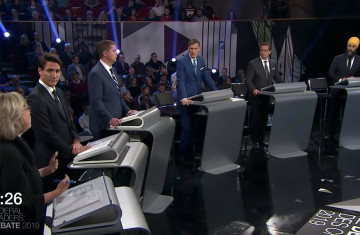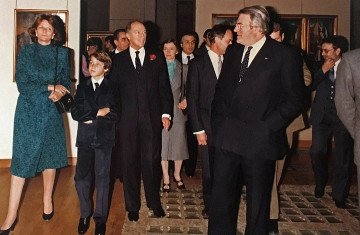Time for politicians to play nice
Adrian Heaps asks Prime Minister Trudeau to put aside the rancorous tone of the 2019 election and respect Canada’s history of co-operation and compromise by including members of other parties in his new cabinet.

The party leaders, starting with the Prime Minister, should remember that Canada was built on collaboration and compromise.
I was having a discussion with a friend about the recent election results when she noted that Canadians are smarter than we think at the polls. They believed overall in the Liberal approach, but were disappointed with the performance of a majority government. So what to do? By electing a minority, the country’s voters have sent a clear message to this government: Start to play nice and tap into the expertise of your apparent political opponent, and let’s all think about the interests of the country.
Of course, for the losers still licking their wounds, the idea of working with the other side might constitute nothing less than a betrayal of their principles. The reality is that if party leaders were actually campaigning on principles, we would have had a more dignified election instead of the malicious and accusatory melee that took place for 36 days. Mind you, when you look at the people who were vying for your vote and attention, the choices were not stellar. On one side we had a guy who partied in “blackface” many moons ago. He was running against a guy who happened to forget to tell Canadians he was also an American. Oh yes, and didn’t he repeatedly state that he used to sell insurance, although he in fact never had a licence to sell insurance? Then we had a person who shared a stage with suspected Sikh extremists, which he somehow neglected to acknowledge.
Voters have sent a clear message to this government: tap into the expertise of your opponent, and think about the interests of the country.
The fact is that these people are not infallible because they are simply human. And, just like in every election, we spend too much time trying to project our own imperfections on people we expect to embody perfection itself. Isn’t it about time we started to realize that people running for office are just human beings who have decided to step outside their comfort zone and represent their constituents on a local or national level?
Unfortunately, as new politicians, they start out with all their principles intact, and over time they start to breathe in the air from the party culture. The handlers start to work them over and mould and sometimes manipulate their message so they can maximize voter participation. Ideas are shrouded in verbal subterfuge and end up as bite-sized stanzas. In the end, they become political autotrons promising the world to voters while exposing weaknesses in their opponents, all because they believe the voter is too stupid to absorb any intelligent ideas.
The only good thing about this is that in Canada, unlike in some countries immediately to the south, it doesn’t matter who really wins the election. LGBTQ rights will still be in place, and assisted dying will still be respected. The Canadian core value system that permeates every facet of our lives will still be whole after the votes are counted. This is what makes our country great, yet politicians of all stripes fail to understand that compromise and co-operation are what built this country and drove the most proficient of our prime ministers to truly represent the people.

Pierre Trudeau taught his son Justin to listen to other perspectives. Now it’s time to put that into action.
Why does Canada always fail to recognize its potential? Is it because we were colonized by the British for so many years and now feel the United States is our babysitter? Of course, pondering our life status is a full-time job for Canadians, to the point that I am surprised we don’t have a Ministry of Navel Gazing. We are constantly wondering and consulting, seeking consensus and compromise. There are plenty of examples.
In 1977 the federal government, in response to the election of a sovereignty-oriented Quebec government, convened The Task Force on Canadian Unity. It was co-chaired by Jean-Luc Pépin, a former federal Liberal cabinet minister, and John Robarts, former Conservative premier of Ontario. Its purpose was to gather opinions about unity-related problems in the country, publicize efforts being made to solve those problems and advise the government on how to strengthen national unity.
It was an interesting report that adorned many shelves across the county. A few years later came The Citizens’ Forum on Canada’s Future. After the failure of the Meech Lake Accord, Brian Mulroney realized that it was time for this country to engage once again in our national pastime of looking inward. He surmised that the Meech Lake Accord, while a failure for some, was indeed an opportunity for the country to start to examine itself. Considering the ink was still wet on the new Canadian Constitution, maybe he was right. Keith Spicer chaired the commission dubbed the Citizens’ Forum on Canada’s Future. Over its term it was nicknamed the “people’s commission,” and among the thousands of pages of verbiage it contained, one statement by Spicer stood out. According to the Chair, the report would act as a prism for the country, by taking millions of viewpoints and focusing them into one unified vision. Never have more eloquent words been uttered as a result of a national commission.
It was his father who told Justin that, no matter what the argument is, it is possible to respect another opinion and work to resolve a problem.
On a human level, not so many years ago, eight-year-old Justin Trudeau was taken for lunch in the parliamentary dining room by his father, then-Prime Minister Pierre Trudeau. After Justin made a joke about someone in the room, his father took him aside and told him that it’s possible to disagree with someone without denigrating their character. It was his father who told him that, no matter what the argument is, it is possible to respect another opinion and work to resolve a problem. And it was his father who demanded of him, and indeed of this country, that we exhibit tolerance of other opinions and differences. Over the years, his son and the country have forgotten this mantra, and instead have given in to the people around him, and us.
So what does this all mean, especially after the fractious election of 2019? Maybe Justin Trudeau needs to shed his cloak of advisers and listen to the soul of the country—and heed the words of his father. He could start by appointing some of his so-called opponents to cabinet positions. There is plenty of talent to choose from. The gesture would be outlandish and innovative and would create a truly collaborative working government that would serve the country and not just self-serve.
Wasn’t it Trudeau who said we must celebrate our diversity, that in fact it is our strength? He added that we must learn to co-operate and understand our differences, not reinforce them.
Well, here’s his chance to begin a new dawn of Canadian politics. Appointing members of other parties to cabinet will include, not alienate them. It will force collaboration and co-operation. It will demonstrate to Canadians that people from different backgrounds and beliefs can work together. It’s no good preaching the virtues of this to the public if government itself can’t set an example. There is no better chance for Canada to show its true mettle to the world than by becoming a progressive role model for others to follow.
That’s how we evolved as a country, and it’s how we can evolve as a society. As Lester Pearson said. “We are a solution looking for a problem.”
